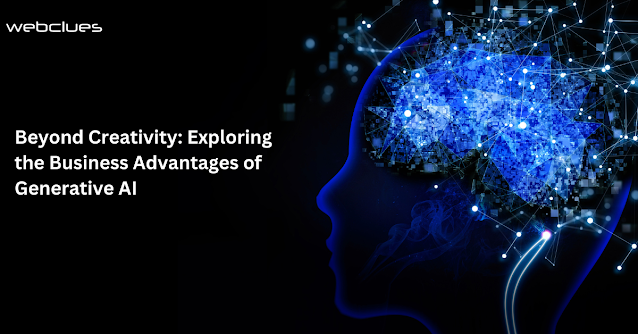Generative Artificial Intelligence extends far beyond its role in fostering creativity; it also serves as a powerful tool with numerous business advantages. As organizations increasingly embrace generative AI technologies, they unlock opportunities to streamline processes, enhance decision-making, and gain a competitive edge in the digital landscape.
1. Content Creation and Marketing:
Generative AI significantly impacts content creation and marketing strategies, showcasing the advantages of generative AI. Content generation models can produce engaging and personalized content at scale. For instance, natural language processing models like GPT-3 can automate the creation of blog posts, social media content, and product descriptions. This not only saves time but also ensures consistency and relevance across various channels.
Moreover, generative AI enables the creation of targeted advertising materials. By understanding user preferences and behavior, businesses can tailor their marketing content for specific demographics, increasing the effectiveness of their campaigns.
2. Product Design and Innovation:
In the realm of product design, generative AI showcases its prowess with the advantages of generative AI by facilitating innovation by generating and iterating on design concepts. Designers can input constraints and objectives into the system, and generative algorithms can produce a myriad of design options. This accelerates the ideation phase, allowing teams to explore diverse possibilities and optimize designs efficiently.
Additionally, generative AI is leveraged in engineering and manufacturing processes. For example, in automotive design, generative algorithms can optimize the structure of components for weight, durability, and performance, leading to more efficient and innovative designs.
3. Advantages of GenAI in Data Analysis and Decision-Making:
Generative AI contributes to data analysis and decision-making by extracting valuable insights from large datasets. Machine learning models, including generative algorithms, can identify patterns, trends, and anomalies in data that might be challenging for traditional analytics methods.
Businesses can utilize generative AI to predict market trends, customer preferences, and potential risks. This foresight enables informed decision-making and strategic planning. Moreover, generative models can simulate different scenarios, aiding businesses in evaluating potential outcomes and mitigating risks before implementing new strategies.
4. Personalized Customer Experiences:
Generative AI enhances customer interactions by enabling personalized experiences. Chatbots powered by natural language processing can engage with customers in real time, providing personalized recommendations, addressing queries, and facilitating seamless transactions. This level of personalization fosters customer satisfaction and loyalty.
Furthermore, generative AI can be employed to create personalized products and services. For example, in e-commerce, recommendation engines driven by generative algorithms can suggest products based on individual preferences, purchase history, and browsing behavior.
5. Automating Repetitive Tasks:
Generative AI plays a pivotal role in automating repetitive and time-consuming tasks, freeing up human resources for more strategic and creative endeavors. Robotic Process Automation (RPA) powered by generative algorithms can handle routine tasks such as data entry, invoice processing, and customer support inquiries.
This automation not only increases operational efficiency but also reduces the likelihood of errors associated with manual processes. Businesses can redirect human resources towards higher-value tasks that require critical thinking and creativity.
6. Language Translation and Global Communication:
Generative AI models excel in language-related tasks, including translation. Businesses operating globally can leverage these models to facilitate effective communication with international audiences. Advanced language models can provide accurate and context-aware translations, overcoming language barriers and ensuring clarity in global interactions.
Moreover, generative AI contributes to the localization of content, ensuring that marketing materials and product information resonate culturally with diverse audiences. This fosters better engagement and acceptance in international markets.
7. Cybersecurity and Fraud Detection:
In the realm of cybersecurity, generative AI models enhance threat detection and response mechanisms. These models can analyze patterns in network traffic, identify anomalies, and predict potential security breaches. By continuously learning and adapting to evolving threats, generative AI contributes to a proactive approach in safeguarding digital assets.
Additionally, generative AI is instrumental in fraud detection across various industries. By analyzing transaction data and user behavior, these models can identify suspicious activities and mitigate financial risks.
In conclusion, the business advantages of generative AI extend beyond creativity, encompassing a wide array of applications that transform how organizations operate and innovate. From content creation and personalized customer experiences to data analysis, automation, and cybersecurity, the integration of generative AI enhances efficiency, decision-making, and overall competitiveness in today's dynamic business landscape. As businesses continue to explore and implement generative AI technologies, they position themselves at the forefront of technological innovation, poised for sustained growth and success, WebClues Infotech offers tailored Generative AI solutions. Elevate your operations, enhance decision-making, and stay ahead in today's dynamic business landscape with our expertise. Transform creativity into efficiency – explore the endless possibilities now!


0 Comments